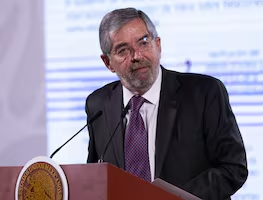Más Información

Analizan reunión de cancilleres para enero; buscan coordinar estrategias antes posibles deportaciones masivas

Sheinbaum: se trabaja para que migrantes puedan acceder a programas del bienestar; colaboran Segob y consulados

“Estamos cubiertos”; de la Fuente asegura “suficiente presupuesto” para apoyar a migrantes ante posible deportación masiva
In addition to the pressures of governments for the North American Free Trade Agreement ( NAFTA ) negotiation, the Canadian unions have demanded that Mexico increases its wages , since 52% of Mexicans live in poverty, according to Jerry Dias, the president of one of the most important unions in Canada, Unifor.
For the Canadian entrepreneurs – who had an active participation in this round of negotiations – “there's just no way to compete” with Mexican labor, considering the low wages of Mexican workers. A fact that also has half of the Mexican population living in poverty .
“The renegotiation issue is not Canada, it's Mexico and its negotiators, who don't want to review wages,” claims Dias.
In an interview during the fourth day of negotiations, the Unifor representative said at some point Mexico will have to give in regarding the labor issue because it's a part of the negotiation processes.
“We can't have a trilateral agreement where the minimum wage of Mexico being 0.90 [American] Dollars; we can't have a trilateral agreement below the four dollars an hour,” he said.
He added that the treaty would have to be modified to protect and create American and Canadian jobs because, under the current provisions, the migration of good jobs continues towards Mexico.
“Things have to get fixed, although we aren't afraid either of leaving the negotiation table,” said the businessman.
He added that it was quite sad that factories are being closed in Canada just to see them reopen later in Mexico.
The petition of the Unifor representative – which comprises 310 thousand Canadian workers – is a direct contrast to the statement of the Mexican Secretary of Economy, Ildefonso Guajardo, who said the issue of wages wasn't part of the renegotiation since it was an internal matter of each country.
During the first day of negotiations, Americans asked Mexico to increase its wages. That same day, Juan Pablo Castañón, president of the Enterprises Coordinating Board, said wages are increased based on the productivity and competitivity of a country.
am







